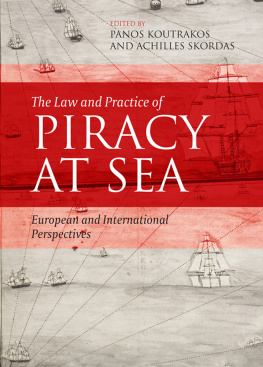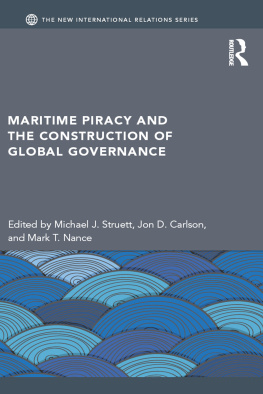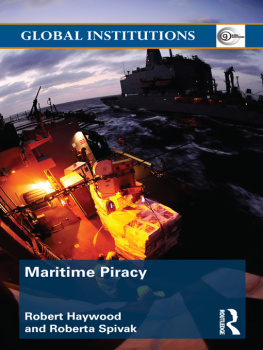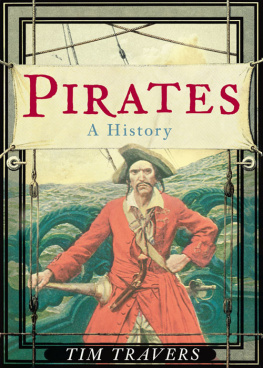Maritime Piracy and Its Control
Other Palgrave Pivot titles
Letizia Guglielmo and Lyne Lewis Gaillet (editors): Contingent Faculty Publishing in Community: Case Studies for Successful Collaborations
Katie Digan: Places of Memory: The Case of the House of the Wannsee Conference
Mario La Torre: The Economics of the Audiovisual Industry: Financing TV, Film and Web
Piero Formica: The Role of Creative Ignorance: Portraits of Path Finders and Path Creators
James Carson: The Columbian Covenant: Race and the Writing of American History
Tomasz Kamusella: Creating Languages in Central Europe during the Last Millennium
Imad A. Moosa and Kelly Burns: Demystifying the MeeseRogoff Puzzle
Kazuhiko Togo and GVC Naidu (editors): Building Confidence in East Asia: Maritime Conflicts, Interdependence and Asian Identity Thinking
Aylish Wood: Software, Animation and the Moving Image: Whats in the Box?
Mo Jongryn (editor): MIKTA, Middle Powers, and New Dynamics of Global Governance: The G20s Evolving Agenda
Holly Jarman: The Politics of Trade and Tobacco Control
Cruz Medina: Reclaiming Poch@ Pop: Examining the Rhetoric of Cultural Deficiency
David McCann: From Protest to Pragmatism: The Unionist Government and North-South Relations from 195972
Thijl Sunier and Nico Landman: Transnational Turkish Islam: Shifting Geographies of Religious Activism and Community Building in Turkey and Europe
Daria J. Kuss and Mark D. Griffiths: Internet Addiction in Psychotherapy
Elisa Giacosa: Innovation in Luxury Fashion Family Business: Processes and Products Innovation as a Means of Growth
Domagoj Hruka: Radical Decision Making: Leading Strategic Change in Complex Organizations
Bjrn Mller: Refugees, Prisoners and Camps: A Functional Analysis of the Phenomenon of Encampment
David Ralph: Work, Family and Commuting in Europe: The Lives of Euro-commuters
Emily F. Henderson: Gender Pedagogy: Teaching, Learning and Tracing Gender in Higher Education
Mihail Evans: The Singular Politics of Derrida and Baudrillard
Bryan Fanning and Andreas Hess: Sociology in Ireland: A Short History
Tom Watson (editor): Latin American and Caribbean Perspectives on the Development of Public Relations: Other Voices
Anshu Saxena Arora and Sabine Bacoul-Jentjens (editors): Advertising Confluence: Transitioning the World of Marketing Communications into Social Movements
Bruno Grancelli: The Architecture of Russian Markets: Organizational Responses to Institutional Change

Maritime Piracy and Its Control: An Economic Analysis
C. Paul Hallwood
Professor of Economics, University of Connecticut, United States
and
Thomas J. Miceli
Professor of Economics, University of Connecticut, United States


MARITIME PIRACY AND ITS CONTROL
Copyright C. Paul Hallwood and Thomas J. Miceli, 2015.
All rights reserved.
First published in 2015 by
PALGRAVE MACMILLAN
in the United Statesa division of St. Martins Press LLC,
175 Fifth Avenue, New York, NY 10010.
Where this book is distributed in the UK, Europe and the rest of the world, this is by Palgrave Macmillan, a division of Macmillan Publishers Limited, registered in England, company number 785998, of Houndmills, Basingstoke, Hampshire RG21 6XS.
Palgrave Macmillan is the global academic imprint of the above companies and has companies and representatives throughout the world.
Palgrave and Macmillan are registered trademarks in the United States, the United Kingdom, Europe and other countries.
ISBN: 9781137461513 EPUB
ISBN: 9781137461506 PDF
ISBN: 9781137465276 Hardback
Library of Congress Cataloging-in-Publication Data is available from the Library of Congress.
A catalogue record of the book is available from the British Library.
First edition: 2015
www.palgrave.com/pivot
DOI: 10.1057/9781137461506
Contents
List of Figures
List of Tables
Preface
Piracy is the oldest international crime, and in international law pirates are regarded as the enemies of mankind. While prevalent in the seventeenth and eighteenth centuries, piracy has not gone away. Today it primarily afflicts the waters off two continentsEast and West Africa and Southeast Asiabut it can and does strike worldwide at any time. It is a serious threat to international shipping, and it imposes high financial costs as well as costs in terms of human life and welfare. Over the past ten years 3,000 or more pirate attacks, actual or attempted, have been reported, with annual costs estimated to be in the range of $6$7 billion. This amount is actually down from as much as $16 billion just a few years agodue in large part, we believe, to the increasing use of on-board armed guards. Still, the problem remains a significant one that has bedeviled international efforts at enforcing anti-piracy laws. The purpose of this monograph is to use economic methods both to describe the nature of maritime piracy and to understand the difficulties involved in organizing optimal enforcement efforts.
Using economic theory to understand the motivation for, and control of, maritime piracy is a direct application of the economic theory of law enforcement, which is a sub-field within the area of law and economics. Beginning with the seminal analysis by Gary Becker (1968), this approach relies on two fundamental principles: first, that pirates (or any would-be criminals) behave rationally in the sense that they respond to threatened sanctions in deciding whether or not to commit illegal acts; and second, that an enforcement authority (whether under the control of a single government or a coalition of governments) stands ready to enforce those sanctions. With respect to the first of these claims, although some crime is no doubt committed by irrational or mentally impaired individuals, there is considerable evidence that domestic offenders do in fact respond to threatened punishments. (If they didnt, then discussion of using criminal penalties as a deterrent would be pointless.) As for modern-day pirates, the huge material gain that they can earn from their criminal activity is surely an important objective, notwithstanding some claims that Somali pirates are acting in response to overfishing and other unfair practices by foreign agents in Somali waters.
As to enforcement, we offer several reasons for the apparent insufficiency of enforcement efforts against maritime piracy. These include the public good nature of law enforcement in general, which allows countries to free-ride on the enforcement efforts of others; the high cost of detaining, prosecuting, and incarcerating pirates; and inconsistent (or in some cases non-existent) national laws against piracy. To understand why these problems have been allowed to persist, we examine the main features of international law that governs the conduct of nations. Unfortunately, the self-interests of many countries, coupled with an anarchic system of law, exemplify the inability of the community of nations to efficiently regulate many forms of international interaction, including piracy. By way of contrast, we note that piracy during the so-called Golden Age in the North Atlantic, from about 1690 to 1730, was brought to an end by effective policing of both the high seas and of landward pirate bases. We argue that this was because the free-rider problem was much less prevalent then than now, largely because most trade in the North Atlantic in that earlier era was controlled by just a few countries.
Next page











